
The men's sabre was one of seven fencing events on the Fencing at the 1924 Summer Olympics programme. It was the seventh appearance of the event, the only fencing event to have been on the programme at every Games. The competition was held from Tuesday July 16, 1924 to Thursday July 18, 1924. 47 fencers from 15 nations competed. Nations were limited to four fencers each, down from eight in 1920. The event was won by Sándor Pósta of Hungary, beginning a nine-Games streak in which Hungarians won the gold medal in the men's sabre. Roger Ducret of France took silver, while another Hungarian, János Garay, earned bronze.
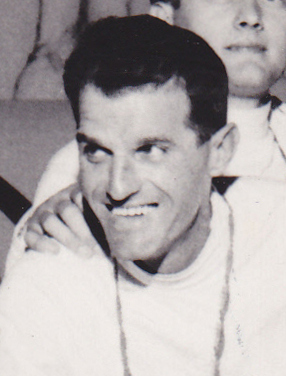
The men's sabre was one of seven fencing events on the fencing at the 1956 Summer Olympics programme. It was the thirteenth appearance of the event. The competition was held on 5 December 1956. 35 fencers from 17 nations competed. Nations had been limited to three fencers each since 1928. The event was won by Rudolf Kárpáti, the seventh of nine straight Games in which a Hungarian would win the event. Jerzy Pawłowski of Poland took silver and Lev Kuznetsov of the Soviet Union took bronze, the first medals in the event for each nation and the first time since 1924 that any nation other than Hungary and Italy earned a medal in the men's sabre.

The men's sabre was one of eight fencing events on the fencing at the 1960 Summer Olympics programme. It was the fourteenth appearance of the event. The competition was held from 7 to 8 September 1960. 70 fencers from 29 nations competed. Nations had been limited to three fencers each since 1928. The event was won by Rudolf Kárpáti, the eighth of nine straight Games in which a Hungarian would win the event. Kárpáti was the second man to successfully defend an Olympic title in the men's sabre and fifth to win multiple medals of any color. His teammate Zoltán Horváth took silver while Wladimiro Calarese of Italy finished with the bronze.

The men's épée was one of eight fencing events on the fencing at the 1968 Summer Olympics programme. It was the fifteenth appearance of the event. The competition was held from 21 to 22 October 1968. 72 fencers from 28 nations competed. Each nation was limited to three fencers. The event was won by Győző Kulcsár of Hungary, the nation's first medal in the men's individual épée. Defending gold medalist Grigory Kriss of the Soviet Union took silver, becoming the eighth man to win multiple medals in the event and extending the Soviet podium streak to three Games. Italy returned to the podium as well after a one-Games absence broke its six-Games gold medal streak, with Gianluigi Saccaro earning bronze.
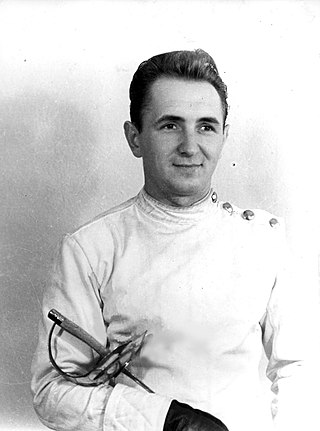
The men's sabre was one of eight fencing events on the fencing at the 1968 Summer Olympics programme. It was the sixteenth appearance of the event. The competition was held from 16 to 17 October 1968. 40 fencers from 16 nations competed. Nations had been limited to three fencers each since 1928. The event was won by Jerzy Pawłowski of Poland, breaking a nine-Games string of Hungarian victories in the event. Hungary's best result in the event was Tibor Pézsa's bronze; Pézsa beat Pawłowski in the final pool but the Hungarian lost two other bouts while the Pole was otherwise flawless. Mark Rakita of the Soviet Union lost only to Pawłowski in the final pool, forcing another bout to break the tie between them for gold and silver; that barrage bout was decided by a single point as Pawłowski beat Rakita 5–4.
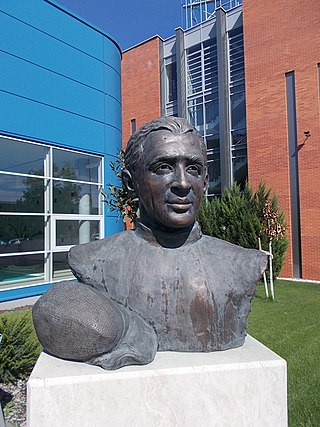
The men's épée was one of eight fencing events on the fencing at the 1972 Summer Olympics programme. It was the sixteenth appearance of the event. The competition was held from 4 to 6 September 1972. 71 fencers from 28 nations competed. Each nation was limited to three fencers. The event was won by Csaba Fenyvesi of Hungary, the nation's second consecutive victory in the event. His countryman Győző Kulcsár, the 1968 gold medalist, earned bronze this time to become the ninth man to win multiple medals in the men's individual épée. Silver went to Jacques Ladègaillerie of France; the French épéeists, a power in the event from 1900 to 1932, earned their first individual medal in 40 years. The three-Games podium streak of the Soviet Union was snapped, with all three Soviet fencers reaching the semifinals but eliminated there.
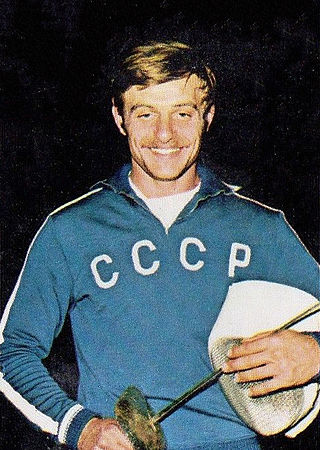
The men's sabre was one of eight fencing events on the fencing at the 1972 Summer Olympics programme. It was the seventeenth appearance of the event. The competition was held from 30 to 31 August 1972. 53 fencers from 22 nations competed. Nations had been limited to three fencers each since 1928. The event was won by Viktor Sidyak of the Soviet Union, the nation's first victory in the event. Hungary had lost its nine-Games gold medal streak in 1968 but remained a power in the event; Péter Marót took silver to extend Hungary's podium streak to 11 Games. Another Soviet, Vladimir Nazlymov, earned bronze.
The men's team sabre was one of eight fencing events on the fencing at the 1972 Summer Olympics programme. It was the fourteenth appearance of the event. The competition was held from September 3 to 4, 1972. 63 fencers from 13 nations competed.

The men's épée was one of eight fencing events on the fencing at the 1976 Summer Olympics programme. It was the seventeenth appearance of the event. The competition was held from July 22 to 23 1976. 64 fencers from 26 nations competed. Each nation was limited to 3 fencers. The event came down to a three-way barrage among the medalists, with two West German fencers joining Győző Kulcsár of Hungary in this tie-breaker fencing session. Alexander Pusch won against both opponents in the barrage to take gold, with Hans-Jürgen Hehn defeating Kulcsár for silver. The medals were the first for West Germany in the men's individual épée. Kulcsár's bronze made him the second man to earn three medals in the event.

The men's sabre was one of eight fencing events on the fencing at the 1976 Summer Olympics programme. It was the eighteenth appearance of the event. The competition was held from July 21 to 22, 1976. 46 fencers from 18 nations competed. Nations had been limited to three fencers each since 1928. The event was won by Viktor Krovopuskov of the Soviet Union, the nation's second consecutive victory in the men's sabre. The Soviet Union's two gold medals in the event moved it out of a six-way tie into sole possession of second place all-time, after Hungary with 11. The Soviet team swept the men's sabre medals in 1976, with Vladimir Nazlymov taking silver and Viktor Sidyak bronze. It was the third sweep in the event. Nazlymov and Sidyak were the eighth and ninth men to win multiple medals in the event. Excluding matches against each other, the three Soviets went 48–3 during the tournament. For the first time since 1900, Hungary competed in the men's sabre but did not win a medal.
The men's team sabre was one of eight fencing events on the fencing at the 1976 Summer Olympics programme. It was the fifteenth appearance of the event. The competition was held from July 26 to 27, 1976. 63 fencers from 14 nations competed.

The men's sabre was one of eight fencing events on the fencing at the 1980 Summer Olympics programme. It was the nineteenth appearance of the event. The competition was held from 24 to 25 July 1980. 30 fencers from 12 nations competed. Nations had been limited to three fencers each since 1928. The event was won by defending champion Viktor Krovopuskov of the Soviet Union, the nation's third consecutive victory in the event. Krovopuskov was the third man to successfully defend a sabre title and the 10th man to win two medals of any color in the event. His teammate Mikhail Burtsev took silver. Imre Gedővári's bronze medal returned Hungary to the podium after a one-Games absence broke an eleven-Games streak.
The men's team sabre was one of eight fencing events on the fencing at the 1980 Summer Olympics programme. It was the sixteenth appearance of the event. The competition was held from 28 to 29 July 1980. 63 fencers from 8 nations competed.
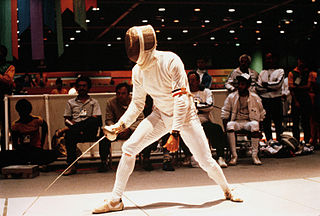
The men's épée was one of eight fencing events on the fencing at the 1984 Summer Olympics programme. It was the nineteenth appearance of the event. The competition was held from August 7 to 8 1984. 63 fencers from 26 nations competed. Each nation was limited to 3 fencers. The event was won by Philippe Boisse of France, the nation's first victory in the men's individual épée since 1928 and fourth overall. France also took bronze, with Philippe Riboud winning the bronze medal match after losing to Boisse in the semifinals. It was Riboud's second consecutive bronze medal in the event, making him the 10th man to earn multiple medals in the individual épée. Silver went to Björne Väggö of Sweden. Hungary's four-Games podium streak in the event ended due to that nation joining the Soviet-led boycott.
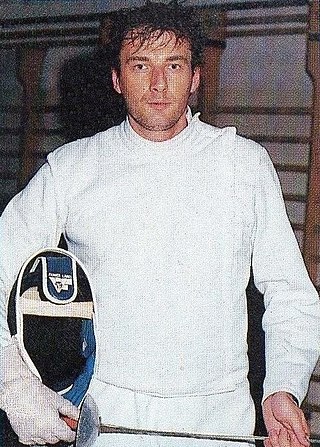
The men's sabre was one of eight fencing events on the fencing at the 1984 Summer Olympics programme. It was the twentieth appearance of the event. The competition was held from August 3 to 4, 1984. 33 fencers from 16 nations competed. Nations had been limited to three fencers each since 1928. The event was won by Jean-François Lamour of France, the nation's first victory in the event since 1900. Marco Marin of Italy took silver and Peter Westbrook of the United States took bronze. It was the first medal in the event in many Games for each of the three nations since 1964 for France, since 1960 for Italy, and since 1904 for the United States), as the men's sabre competitions had been dominated by Hungary and the Soviet Union. With both of those nations boycotting the 1984 Games, other nations had an opportunity to win medals in the sabre.
The men's team sabre was one of eight fencing events on the fencing at the 1984 Summer Olympics programme. It was the seventeenth appearance of the event. The competition was held from 8 to 9 August 1984. 40 fencers from 8 nations competed.
The men's épée was one of eight fencing events on the fencing at the 1988 Summer Olympics programme. It was the twentieth appearance of the event. The competition was held from 23 to 24 September 1988. 79 fencers from 33 nations competed. Each nation was limited to 3 fencers. The event was won by Arnd Schmitt of West Germany, the nation's second victory in the event. France's Philippe Riboud took silver, adding to his 1980 and 1984 bronze medals to become the third man to earn three medals in the individual épée. Andrey Shuvalov earned the Soviet Union's first medal in the event since 1968 with his bronze.

The men's sabre was one of eight fencing events on the fencing at the 1988 Summer Olympics programme. It was the twenty-first appearance of the event. The competition was held from 22 to 23 September 1988. 40 fencers from 18 nations competed. Nations had been limited to three fencers each since 1928. The event was won by defending champion Jean-François Lamour of France, the fourth man to successfully defend an Olympic title in the sabre and the 11th man overall to win multiple medals in the event. It was France's third victory in the event, matching the Soviet Union for second-most all-time. Janusz Olech took silver, Poland's first medal in the event since 1968. Italian Giovanni Scalzo earned bronze.
The men's team sabre was one of eight fencing events on the fencing at the 1988 Summer Olympics programme. It was the eighteenth appearance of the event. The competition was held from September 28 to 29, 1988. 53 fencers from 11 nations competed.
The women's foil was one of eight fencing events on the fencing at the 1988 Summer Olympics programme. It was the thirteenth appearance of the event. The competition was held from 21 to 22 September 1988. 45 fencers from 19 nations competed.










